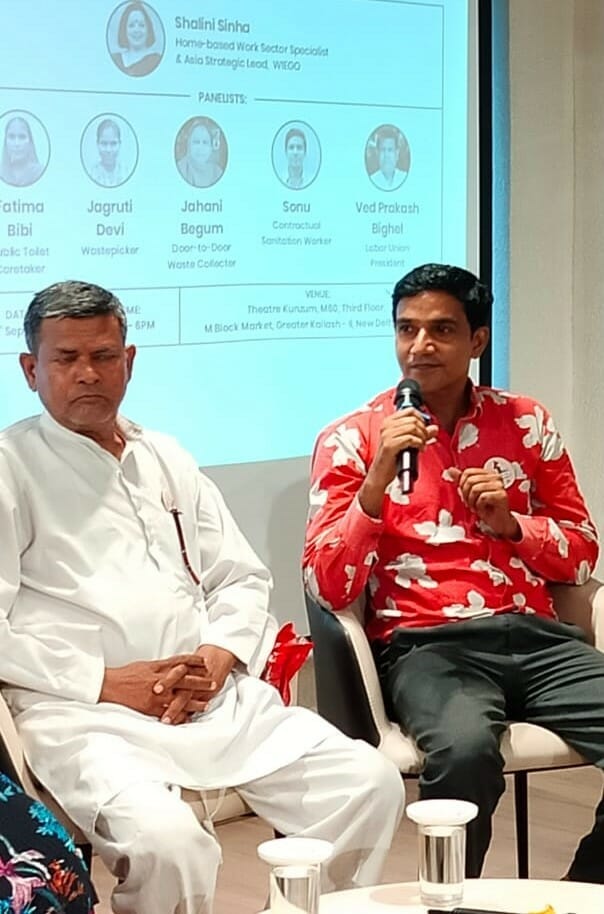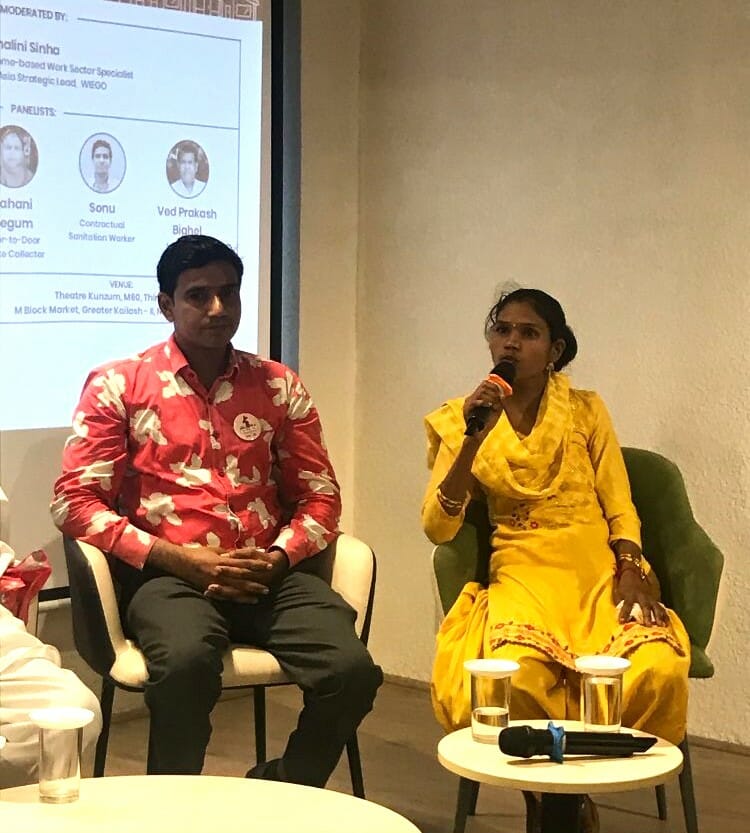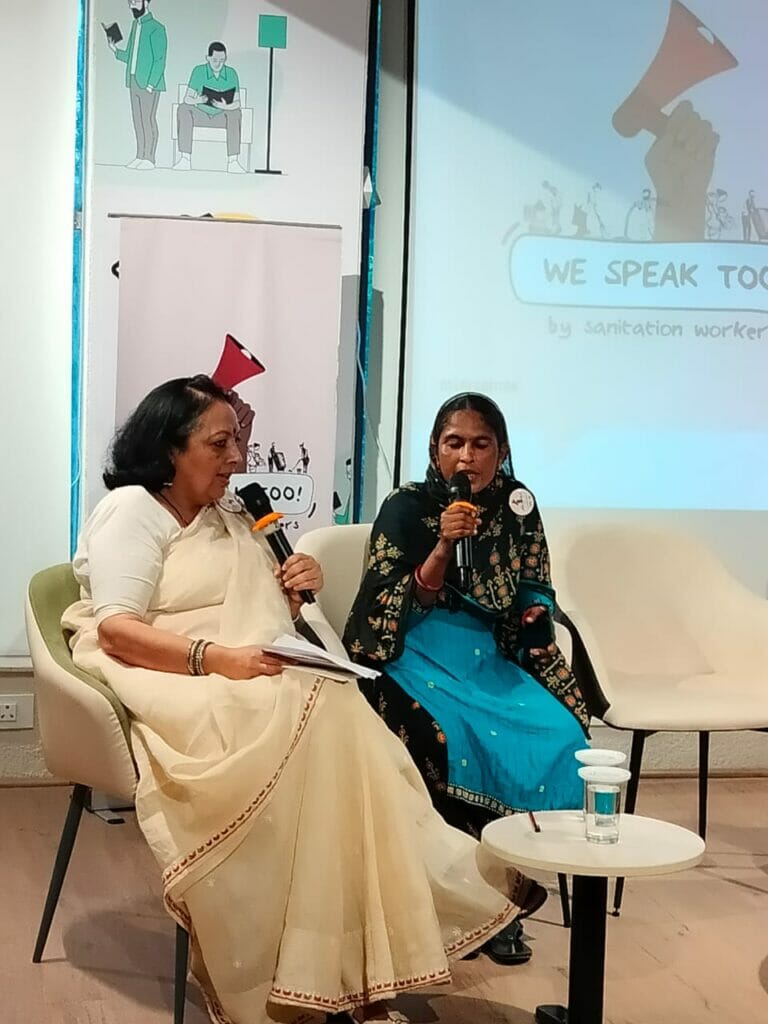“We are not treated as humans: hamein koi izzat nahi deta hai” — a common sentiment resonating through the voices of waste workers, who gathered for a recent event in Delhi. It is indeed ironic that those who clean for us are considered ‘dirty’ or unclean and seldom treated with the respect and courtesy that every human being deserves. The rhetoric of Swachh Bharat, despite being sung in high decibels, rarely resonates with these groups, let alone include their rights and dignity in the clarion call for a Clean India.
These workers often belong to socially and economically oppressed classes and castes, and exist on the margins of society. Their social interaction is always marked by prejudice and discrimination.
On September 16 2023, waste and sanitation workers in Delhi came together for an event titled ‘We speak too – by Sanitation Workers’, organised by the Delhi Round Table on Solid Waste Management (DRT), in partnership with AIW (Alliance for Indian Waste Pickers) and IIHS (Indian Institute of Human Settlements). Here, they highlighted their precarious work conditions, low incomes and lack of social security and spoke poignantly about their challenges and aspirations. But most of all, they demanded izzat.
Many complained about how they are called by derogatory names — kura wala, kachra wala, bai — repeatedly highlighting, sometimes with a sardonic smile and occasionally in frustrated angst, that they clean and manage waste, they do not generate waste. The waste generators are those who call them names and look down on them!
Read more: No, those who make a living out of waste are not ‘rag pickers’
Fast-eroding social protection (or whatever was left of it)
Sonu cleans the roads, highways and drains in the South Delhi area, employed as a contractual worker with the municipality of the city. He recounted the stories of the past, before the 2000s: Sanitation workers then had permanent jobs, where they were directly employed by the local MCDs and state departments.
The subsequent shift to temporary and contractual work means they now have to toil without medical assistance, pension, or sick leaves. Insurance and other benefits are also not applicable till they become permanent employees, which may happen only after decades of service.
The disparity in salaries of the contractual worker and the permanent for the same work is huge, at over 50%, sans any social protection. The contractualisation and informalisation of sanitation work in India reveal the state-maintained informality and vulnerability of the workers, and the fast erosion of labour rights even for those employed by the state machinery.
The continuous and everyday exploitation of workers
Ved Prakash Bhagel, a retired sanitation worker and sewage cleaner, talked about the extremely hazardous work conditions: cleaning sanitation pits filled with faecal matter, acids and dyes from factories, and household waste, not to mention the deadly gases and working with no equipment or protection gear.

More recently, while bodysuits and some equipment are provided, and machines are increasingly used in Delhi in the formal set up, mechanisation has not benefited many workers. This is because most permanent workers and their positions have been contracted out. Sanitation work being carried out by more precariously located contractual workers is mostly unprotected and unregulated.
How sanitation work operates is eerily like bonded labour, where in spite of the insecurity and dangerous work conditions, the workers opt to remain in the system, as outside of sanitation work, there are few alternative livelihood opportunities open to them.
The struggle for livelihoods
The multiple challenges and concerns of the army of “green” workers in Delhi, who prevent the city from being completely engulfed by its discards, are rarely heard or considered. Jagruti Devi, a woman waste collector, spoke about her hardships during COVID times, compelling her to work three jobs a day — in waste segregation, domestic work and vending — to make ends meet.
Read more: COVID-19 aftermath: Delhi’s ignored waste pickers need immediate protection
She also spoke about the trauma of eviction from their settlement and the cost of rebuilding their lives, time and time again.

Waste pickers collect, segregate and transport waste and make several contributions to Delhi’s well-being by collecting waste and recycling it. Their work reduces the costs of municipalities and the load on dump sites, while contributing to the city’s environment and public health.
Jahanara Begum, another waste worker, spoke about how they make a living laboriously collecting, sorting, and reselling various recyclables, providing substantial economic, environmental and health benefits to the city. According to ‘Wastepickers: Delhi’s Forgotten Environmentalists?’ published by Chintan, a survey of six cities, has shown that the informal sector recycles as much as 66% of solid waste in cities.
Read more: Managing plastic packaging waste: Why the draft EPR rules are likely to fall short
Mechanisation too has worked against waste workers, robbing them of the Right to Work and “access to waste”. This must be ensured for waste pickers, as notified by the MoEF in the Municipal Solid Waste (MSW) guidelines of 2016; but hardly implemented holistically anywhere in the country. In Delhi, mechanisation has led to the destruction of the decentralised infrastructure of waste management called dhalaos (first point of waste collection) in Delhi and the waste heads straight to the dumping sites. Waste pickers have to pay bribes now to access waste for sorting, further reducing their earnings.
Sanitation: A women’s issue?
Fatima Bibi, is employed as a public toilet cleaner in Harizan Basti in Vasant Kunj. 17% of Delhi’s population lives in slums with no access to private toilets, depending on public toilets for their daily needs. For women, toilets are essential facilities, playing a crucial role in dignified living, gender equality, public health, and safety. As a result, workers like Fatima Bibi themselves and their crucial work remain invisible and undervalued.
Fatima lamented about the long hours of work, delayed payments and lack of support from the local administration for safe work conditions and how that restricts her from managing toilets better for the wider public.

States of exception and exploitation
During COVID, authorities called sanitation workers COVID Warriors and asked them to work extra time without any special protection, safety or social security. Similarly, for G20 celebrations recently concluded in the city, the sanitation workers were stretched to the limit and made to work continuously for 16 hours in preparation for the visit without any extra compensation.
Other workers like waste pickers and their livelihoods were impacted adversely by COVID-related shutdowns and G20-related cleaning drives organised by authorities that effectively barred workers and their movement for many days. It is in these ever-continuous states of exception that the exploitation of workers continues, and their dispensability is ever more felt.
When it comes to sanitation work, caste and patriarchy primarily determine who works where. Caste, and now religious marginalisation, of communities is represented in the social hierarchy and exploitation of the workers. The most marginal spaces are occupied by newly entrant migrant workers, where Muslims and Dalits dominate the sanitation workers groups.
What workers want… and the way forward
The sanitation workers of Delhi echo the need to immediately stop the contractualisation of staff. This would be in the best interests and results for the city.
At a more individual level, the workers also feel that self-development is the key; worker collectives of different kinds need to be promoted to help enable better coordination and support for the community. The state should actively enable workers to come together in forums and groups.
The aspect of dignity needs to be looked at and their right in and to the city needs to be recognised. They need minimum wages, the same pay for the same work, all benefits, and social security protection. Women’s contribution needs to be adequately acknowledged and compensated.
Sanitation workers of Delhi deserve visibility in the mainstream and space in the city — to work, live, sit, eat and travel as sanitation workers. They need to be respected and treated with dignity. Another critical issue is housing for workers. All this will require action towards public awareness and education, and concomitant changes in policy.
Lastly, sanitation workers across the spectrum seek and expect more from society to ensure that the next generation can break out from the cycle of undignified labour with access to education and support. It is against this backdrop, that we ought to have celebrated the Swachhta Pakhwara and Swachhta Diwas, by honouring the workers who labour to clean the city.
Our future Swachhta Abhiyaans too need to keep at its core the rights of sanitation workers in Indian Cities. All they ask from us is the dignity of labour and rights granted in the constitution — Samman, Suraksha and Adhikar — Dignity, Security and Rights as workers, in the city.
Is that too much to ask for?